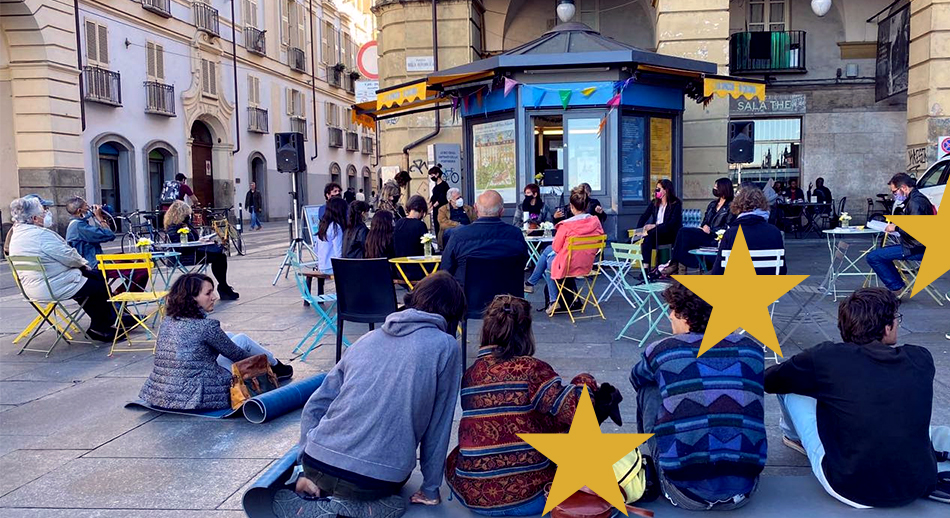New programming brings us new regulations, work plans and calls in some of the most important areas for the Third Sector. Let’s find out all the new features together.
Three important programs for the Third Sector
The issues of rights and citizenship are covered in this programming period by the Citizens , Equality, Rights and Values (also known as CERV, from the English acronym Citizens, Equality, Rights and Values) program, the Justice program and the European Solidarity Corps.
Justice represents a continuation of thesimilar program already in place in the 2014-2020 cycle, while CERV takes up the legacy of two previous programs, the Rights, Equality and Citi zenship Program and the Europe for Citizens program. Justice and CERV have a common funding source, the Justice, Rights and Values Fund, which comes under the European Commission’s DG Justice and Consumers (DG JUST).
Their action is strongly synergistic with that of the European Solidarity Corps, a recent initiative (born in 2016 and established as a program only in 2018), managed by DG Education, Youth, Sport and Culture (DG EAC) and focused on international youth volunteering initiatives.
The three programs Justice, CERV and the European Solidarity Corps cover a very important thematic spectrum: on the one hand, they are the flagship programs in some of the most significant areas for the Third Sector; on the other hand, they are one of the main responses to two of the European Commission’s six strategic priorities (the promotion of European citizenship and democracy and the EU’s fundamental values), while also contributing to the others.
We have recent and important developments for all three programs, albeit in different situations and ways. Let’s see together which ones.
Citizenship, equality, rights and values: the regulation
The Citizens, Equality, Rights and Values(CERV) program is by far the one in which developments are most extensive and significant.
First of all, it has been officially approved the regulations which forms the basis for its operation.
It has a broad and ambitious goal, which directly calls for civil society action: ” […] to protect and promote the rights and values enshrined in the treaties […] on applicable human rights, in particular by supporting civil society organizations […] and encouraging civic and democratic participation, in order to support and further develop open, rights-based, democratic, equitable and inclusive societies that are founded on the rule of law.”
It is divided into four components (with dedicated calls accessible at the respective links):
- Union values (defined as respect for dignity and human rights, freedom, democracy, equality, protection of minorities, pluralism, non-discrimination, tolerance, justice, solidarity and gender equality. This component collects about 46 percent of the budget);
- Citizen involvement and participation (European memory and identity, democratic participation of citizens and exchanges between citizens of different countries. This component collects about 7 percent of the budget);
- Equality, Rights and Gender Equality (combating all kinds of discrimination, inequality and intolerance, promoting the rights of the most vulnerable groups and the rights of Union citizenship) and Daphne (preventing and combating all forms of gender-based violence, against women, children, youth, people with disabilities, LGBTIQ and other at-risk groups, supporting and protecting direct and indirect victims of all forms of violence). These two components collect about 26 percent of the budget.
A specific annex to the regulation defines the wide range of actions that can be financed under the different components of the program.
More information can be found (as well as in the text of the regulations):
- On the update page devoted to CERV program calls;
- On the in-depth page devoted to the genesis of the CERV program;
- On the pages devoted to previous programs Europe for Citizens and Rights, Equality and Citizenship;
- On the website of DG Justice and the Education and Culture Executive Agency(EACEA), which will manage the program (as it already manages Europe for Citizens and the European Solidarity Corps).
Citizenship, equality, rights and values: the work plan and calls for proposals
The work plan of the CERV program for the 2021-2022 biennium has already been published, which presents all useful information to set up the activity on calls for proposals:
- An introduction regarding the vision of the program and its four components;
- The budget available in the biennium in the different areas of the four components;
- The general eligibility and award criteria;
- A detailed list of the different open calls in the four components and main areas, including objectives, beneficiaries involved, priorities, activities, outcomes, specific eligibility criteria, financial allocation and expected timeline.
The first calls for proposals for the new program have also already been published:
- For the Union Values Component:Framework agreements with networks and civil society organizations active on European values (deadline June 22)Grants to framework partners active on European values (deadline June 29)
- For the Equality, Rights and Gender Equality Component:Promoting equality and combating racism, xenophobia and discrimination (deadline June 15)Protecting and promoting the rights of the child (deadline Sept. 7) Call forauthorities in the field of personal data protection (deadline Sept. 9)
- For the Citizen Involvement and Participation Component:European Memory (deadline June 22)
- For the Daphne Component:Preventing and combating gender-based violence and violence against children (deadline June 15)
What’s new in the Justice program
The situation is similar-and full of novelty-under the Justice program, which shares the same funding line as the CERV program, although it has more specific and technical purposes.
It was approved the regulations of the program , which identifies promotion as the main objectives:
- of judicial cooperation in civil and criminal matters, the rule of law, and the independence and impartiality of the judiciary;
- of judicial training, a common legal and judicial culture, and the consistent and effective implementation of the Union’s legal instruments;
- of effective and non-discriminatory access to justice for all, the rights of crime victims, suspects and defendants in criminal proceedings.
It provides for various types of action, not unlike those under the CERV program: awareness raising, mutual learning, analytical and monitoring activities, training, digital tools, development and support of networks and organizations, and dissemination of program knowledge and results.
Again, we recommend further information on the text of the regulation, on the update page dedicated to the Justice program calls, on the in-depth page dedicated to the genesis of the Justice program, on the page dedicated to the previous Justice program, and on the DG Justice website.
Also for the Justice program, a work plan for the period 2021-2022, with a structure similar to the one presented above for CERV: it thus provides all the tools useful for planning activity on calls for proposals in the next two years.
Finally, the first calls for proposals are already available for the Justice program as well:
- Support for national or transnational “e-Justice” projects;
- Support for European networks active in the area of facilitating and promoting judicial cooperation in civil and/or criminal matters and in the area of access to justice;
- Promotion of judicial cooperation in civil and criminal matters;
- Support for transnational judicial training projects in civil law, criminal law or fundamental rights.
The deadline for these first Justice program calls is May 18.
The European Solidarity Corps guide and calls for proposals.
The European Solidarity Corps is one of the most prominent innovations that emerged during the previous programming period. Launched in 2016 and formalized as a program only in 2018, it has already attracted the membership of 275,000 young people, 50,000 of whom are active on specific projects. It picks up the legacy and lessons learned from major European volunteer and youth programs, particularly the European Voluntary Service.
For the new programming period, the European Solidarity Corps aims to double the number of beneficiaries, expand activities to humanitarian projects around the world (for which it will be possible to participate up to the age of 35), and strengthen online learning opportunities for participants.
The mechanism of the European Solidarity Corps is very simple: the program promotes the action of young people or groups of young people (aged between 18 and 35) within organizations engaged in solidarity actions and in possession of a “quality label,” which certifies alignment with the program’s principles, objectives and quality standards.
The program distinguishes between volunteer projects, which take up this basic operational structure, and outreach projects, aimed at fostering new spontaneous activities by groups of young people (with possible support from existing organizations or coaches). The program may also support (to a lesser extent) work or internship activities in similar ways.
The activity can be carried out in the country of residence or in another country, and reimbursed expenses may include travel, organizational and management costs, language learning, preparatory visit, support for disadvantaged groups, contingencies, and a small daily lump sum.
The program is therefore open to both host organizations (for obtaining a “quality label,” hosting and supporting participants) and young participants on a project. The essence of the program is compiled in a simple prospectus, and all information is accessible on the reference site.
The 2021 European Solidarity Corps call for proposals is already available, with deadlines set for May 28 and October 5. A recently updated guide describes all the details necessary for participation. Formalization of the program regulations by community institutions is expected soon.
The European Solidarity Corps will benefit from the support of theEACEA Agency, a network of national agencies (for Italy, theNational Agency for Youth) and a specific online service.
A world of opportunities
There is no shortage of opportunities to build a more just, aware and supportive Europe: the Third Sector has always stood by the community institutions in advancing this project.
Enjoy participating and keep following us with future updates.




